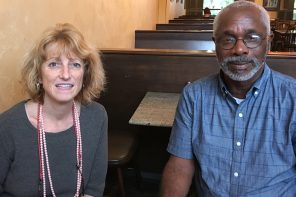By Adam Parker. Read the story here.
It began with a poem.
And now the book “We Are Charleston: Tragedy and Triumph at Mother Emanuel” is out in hardback from Thomas Nelson publishers.
The book, by Herb Frazier, Bernard Powers Jr. and Marjory Wentworth, recounts the shooting of June 17, 2015, and seeks to explain it by mining the history of Emanuel AME Church and the experiences of the people who have filled its pews for 200 years.
After the church attack, The Post and Courier asked Wentworth to write a commemorative poem. It was published on the back page of a special edition of the newspaper on the first Sunday following the violence. Soon, other media outlets took notice, and Wentworth was encouraged to write something more.
At the same time, Wentworth’s publicist Kathy Bennett was expecting a book proposal. When the poet laureate of South Carolina suggested an altogether different sort of book than what Bennett had expected, a volume not of poetry but one that would contextualize the shooting, the publicist readily agreed.
On July 2, Wentworth contacted Frazier, a former newspaper reporter and a book author with whom she had worked once before. It was the right call. Frazier had grown up in the Ansonborough neighborhood, near which Mother Emanuel stands, and he had ties to the church. After the shooting, he was frantic: “What can I do?” he asked himself. And so Wentworth’s call was timely.
Frazier immediately reached out to Powers, a College of Charleston history professor and AME church member with an intimate knowledge of slavery, Jim Crow and the civil rights movement. Powers didn’t hesitate.
“This was in line with what I was doing already,” he said, referring to research on the AME Church. “This created an opportunity to reach a different audience.”
They wrote the book in thirds, tackling three or four chapters at a time, dividing the work among them then sharing what they wrote with one another.
“It was a very vigorous internal editorial process,” Powers said.
They spent many late nights together poring over the work, and even a couple of all-nighters.
They had an outline, but the work was very organic, Frazier said. They kept trying to get at the question “Why?” And they insisted on presenting the history that resulted in persistent racism and violence against blacks. “This didn’t happen in a vacuum,” Frazier said.
Most of all, they tried to give voice to the dead and to honor those who survived.
Wentworth said it was a challenge to address the idea of forgiveness, to convey all that’s involved with nuance and detail.
Too often, she said, people take it at face value. But for black people, forgiveness means much more than clemency or mercy. It’s a profound spiritual and political expression, a gesture of protest, a means of survival.
Powers said he wanted to get past the cliches of Charleston and explain to readers what life here is really like — “those elements that, even if you come here, you won’t necessarily see” — such as persistent segregation, economic inequity, the effects of gentrification, the many symbols of slavery and Jim Crow that one encounters every day in the landscape.
A visitor might think little of the statue of John C. Calhoun or Wade Hampton, but black residents know all too well that these men were opposed to emancipation and desegregation, Powers said.
Frazier said that, for black people, life in Charleston (and beyond) includes a daily dose of micro-aggressions, including a regular defense among some whites of their Southern heritage.
And large problems persist. Emanuel AME Church once was at the center of a thriving black community. Today, it survives in a now mostly white and wealthy area because of its historical importance.
Wentworth recalled growing up in a Jewish community in Massachusetts where everyone always talked about or referenced the Holocaust.
It was a regular topic in school.
When she moved to Charleston in 1989, she was surprised to discover that no one talked about slavery and segregation, and that whites and blacks hardly seemed to commingle.
She said many people today try to make a difference, but Charleston still is victim of its self-imposed segregation and lack of coordinated leadership.
Meantime, all three writers said, black schools are neglected and closed. Literacy programs are cut. Gentrification is forcing blacks off the peninsula.
Frazier said he hopes the book can bust some of the myths.
“I hope readers can see this place in a more honest way,” he said.
Wentworth said the victims of Mother Emanuel were “the best among us” — teachers, a lawmaker, a librarian, civic leaders — guided by a strong moral compass, searching for what Martin Luther King and others called the Beloved Community, in which people come together to fight injustice.
Yet today, in politics and in life, we remain more divided than ever it seems, she said. Presidential candidates spew xenophobic invective and exacerbate these divisions.
“It’s the exact opposite of what these people aspired to,” she said.
Reach Adam Parker at 843-937-5902. Follow him at facebook.com/aparkerwriter.

